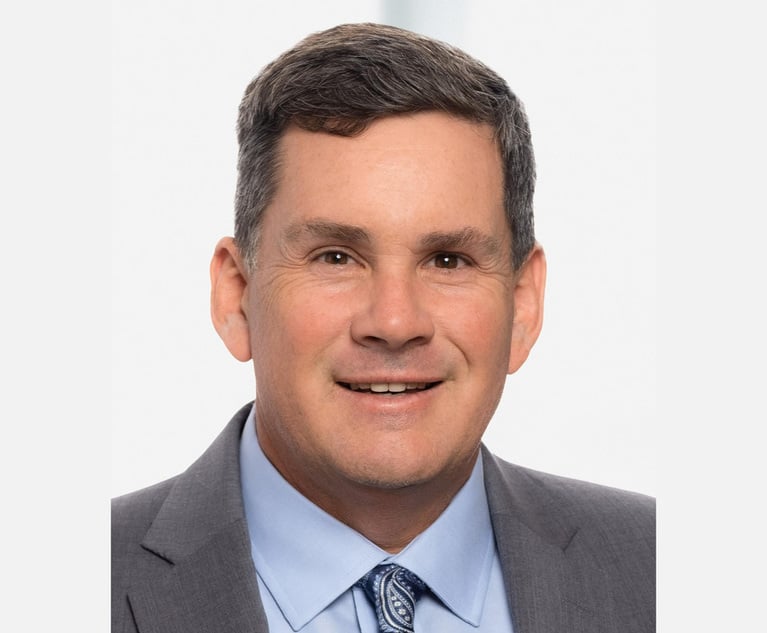5 State AGs Oppose Bankruptcy Stay in Their Opioid Cases Against Insys
A bankruptcy judge in Delaware is set to hear arguments Tuesday over whether to halt 166 government lawsuits against Insys Therapeutics Inc. over the opioid crisis.
July 01, 2019 at 07:35 PM
4 minute read
The original version of this story was published on Delaware Law Weekly
 Photo: Shutterstock.com
Photo: Shutterstock.com
A bankruptcy judge will hear arguments Tuesday over whether to halt hundreds of lawsuits brought against Insys Therapeutics Inc. over the opioid crisis—a move opposed by attorneys general in five states.
Insys wants to halt 166 government lawsuits as part of a complaint for injunctive relief and a motion for preliminary injunction, both filed June 10, the date of its Chapter 11 bankruptcy filing. If a bankruptcy judge approves the motions, attorneys general in 10 states, including Florida, New Jersey and New York, would have their claims against Insys stayed.
Lawyers for the states of Maryland and Minnesota, which have administrative trials scheduled to begin in August and September, opposed the move last week, citing the “police power” exception to a bankruptcy's automatic stay on legal matters. New York, New Jersey and Arizona have joined them.
“Criminal enterprises like the debtors should not be permitted to shield themselves from the consequences of their misconduct by running to bankruptcy court and obtaining the equivalent of a stay that allows them to evade justice,” wrote lawyers for attorneys general in Minnesota and Maryland.
In contrast, Florida Attorney General Ashley Moody and lead plaintiffs attorneys in the multidistrict litigation, both of which have sued several opioid companies, agreed to halt claims against Insys in stipulations filed last week. The multidistrict litigation has two cases going to trial Oct. 21.
Insys is one of several manufacturers of opioids, a class of drugs that includes prescription painkillers tied to increasing deaths and addictions nationwide. Several Insys executives, including founder John Kapoor, have been convicted of racketeering and other crimes related to the opioid crisis.
On June 5, Insys reached a $225 million agreement with the U.S. Justice Department that requires the company to stop marketing and promoting its opioid painkiller Subsys within 90 days.
“A stay of the government actions is essential to realizing the debtors' primary objective in these bankruptcy cases: maximizing the value of the estates and enabling the equitable and efficient distribution of proceeds to creditors,” Insys attorney Richard Heath, a director at Richards, Layton & Finger in Wilmington, wrote in the preliminary injunction motion. “It is imperative for the debtors and their advisors to be afforded the ability to focus on these essential bankruptcy processes without the competing drain of their time and attention caused by the government actions.”
Insys got some support from the bankruptcy's unsecured creditors committee, whose members are mostly personal injury plaintiffs suing over opioids.
“The debtors' cash position is small and projected to shrink over the coming weeks,” wrote Erin Fay, a director at Bayard in Wilmington. “To waste limited estate resources paying litigators with respect to cases that almost certainly will not be resolved before Insys ceases operations simply makes no sense.”
Fay did not respond to a request for comment.
In court filings last week, attorneys general in the five states, some of which have sued only Insys, opposed the move. Minnesota Assistant Attorney General Eric Maloney declined to comment, and Ryan Bounds, a staff attorney at the Maryland attorney general's office, did not respond to a request for comment at the time of publication.
Moody, in Florida, reached a stipulation that the state's claims against Insys should be “abated in their entirety” for an “indefinite duration.” In exchange, according to the June 25 stipulation, Insys agreed to cease marketing and promoting Subsys in Florida within 90 days of the DOJ deal, as well as stop “all business activities related to opioids in the states” within 12 months.
Russell Kent, Florida's special counsel for litigation, did not respond to a request for comment.
The injunction is one of several issues going before U.S. Bankruptcy Judge Kevin Gross this month. On July 8, the judge will hear additional arguments on a related motion Insys filed to set up a plan that would estimate the total value of about 1,000 lawsuits pending against it. Six states—Florida, Kentucky, New York, New Jersey, Rhode Island and Washington—have opposed that plan, as have a handful of cities and states.
This content has been archived. It is available through our partners, LexisNexis® and Bloomberg Law.
To view this content, please continue to their sites.
Not a Lexis Subscriber?
Subscribe Now
Not a Bloomberg Law Subscriber?
Subscribe Now
NOT FOR REPRINT
© 2025 ALM Global, LLC, All Rights Reserved. Request academic re-use from www.copyright.com. All other uses, submit a request to [email protected]. For more information visit Asset & Logo Licensing.
You Might Like
View All

Labaton’s Eric Belfi on Running Case Investigation, Analysis and Delaware Presence

Chancery Stays Action Pending Resolution of a Motion to Dismiss in a First-Filed Action to Which the Defendant Is Not a Party
5 minute read
Chancery Court Exercises Discretion in Setting Bond in a Case Involving Share Transfer Restriction
6 minute readTrending Stories
- 1No Two Wildfires Alike: Lawyers Take Different Legal Strategies in California
- 2Poop-Themed Dog Toy OK as Parody, but Still Tarnished Jack Daniel’s Brand, Court Says
- 3Meet the New President of NY's Association of Trial Court Jurists
- 4Lawyers' Phones Are Ringing: What Should Employers Do If ICE Raids Their Business?
- 5Freshfields Hires Ex-SEC Corporate Finance Director in Silicon Valley
Who Got The Work
J. Brugh Lower of Gibbons has entered an appearance for industrial equipment supplier Devco Corporation in a pending trademark infringement lawsuit. The suit, accusing the defendant of selling knock-off Graco products, was filed Dec. 18 in New Jersey District Court by Rivkin Radler on behalf of Graco Inc. and Graco Minnesota. The case, assigned to U.S. District Judge Zahid N. Quraishi, is 3:24-cv-11294, Graco Inc. et al v. Devco Corporation.
Who Got The Work
Rebecca Maller-Stein and Kent A. Yalowitz of Arnold & Porter Kaye Scholer have entered their appearances for Hanaco Venture Capital and its executives, Lior Prosor and David Frankel, in a pending securities lawsuit. The action, filed on Dec. 24 in New York Southern District Court by Zell, Aron & Co. on behalf of Goldeneye Advisors, accuses the defendants of negligently and fraudulently managing the plaintiff's $1 million investment. The case, assigned to U.S. District Judge Vernon S. Broderick, is 1:24-cv-09918, Goldeneye Advisors, LLC v. Hanaco Venture Capital, Ltd. et al.
Who Got The Work
Attorneys from A&O Shearman has stepped in as defense counsel for Toronto-Dominion Bank and other defendants in a pending securities class action. The suit, filed Dec. 11 in New York Southern District Court by Bleichmar Fonti & Auld, accuses the defendants of concealing the bank's 'pervasive' deficiencies in regards to its compliance with the Bank Secrecy Act and the quality of its anti-money laundering controls. The case, assigned to U.S. District Judge Arun Subramanian, is 1:24-cv-09445, Gonzalez v. The Toronto-Dominion Bank et al.
Who Got The Work
Crown Castle International, a Pennsylvania company providing shared communications infrastructure, has turned to Luke D. Wolf of Gordon Rees Scully Mansukhani to fend off a pending breach-of-contract lawsuit. The court action, filed Nov. 25 in Michigan Eastern District Court by Hooper Hathaway PC on behalf of The Town Residences LLC, accuses Crown Castle of failing to transfer approximately $30,000 in utility payments from T-Mobile in breach of a roof-top lease and assignment agreement. The case, assigned to U.S. District Judge Susan K. Declercq, is 2:24-cv-13131, The Town Residences LLC v. T-Mobile US, Inc. et al.
Who Got The Work
Wilfred P. Coronato and Daniel M. Schwartz of McCarter & English have stepped in as defense counsel to Electrolux Home Products Inc. in a pending product liability lawsuit. The court action, filed Nov. 26 in New York Eastern District Court by Poulos Lopiccolo PC and Nagel Rice LLP on behalf of David Stern, alleges that the defendant's refrigerators’ drawers and shelving repeatedly break and fall apart within months after purchase. The case, assigned to U.S. District Judge Joan M. Azrack, is 2:24-cv-08204, Stern v. Electrolux Home Products, Inc.
Featured Firms
Law Offices of Gary Martin Hays & Associates, P.C.
(470) 294-1674
Law Offices of Mark E. Salomone
(857) 444-6468
Smith & Hassler
(713) 739-1250






